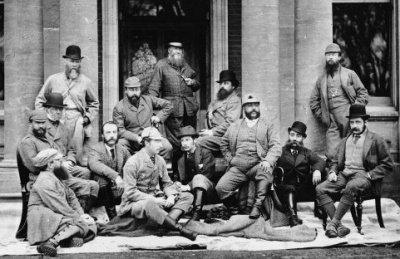Elveden Estate: Difference between revisions
Allenwalla (talk | contribs) m (moved Elveden Hall to Elveden Estate) |
Allenwalla (talk | contribs) mNo edit summary |
||
| Line 1: | Line 1: | ||
'''Elevenden | [[File:Photo at Elvendon.jpg|thumb|right|400px|The Maharaja and Guests, including the Prince of Wales. Can you tell which is the Maharaja and which is the future King of England?]] | ||
'''Elevenden Estatel''' was the name of the estate of [[Maharaja Duleep Singh]], the youngest son of [[Maharaja Ranjit Singh]] and the last Maharaja of the Sikh Raj. The young Sikh ruler became a Court favorite and friend of [[Queen Victoria]] and the Prince of Wales. True to his love of the ''Shikar'' (Royal Hunt) he made Elveden into one of the finest hunting estates in all of England. | |||
In 1849, the | In 1849, the young Maharajah Duleep Singh, ruler of the Punjab and owner of the famous [[Koh-i-noor]] diamond was exiled to England, having been removed from his kingdom by the British East India Company. | ||
The Maharajah purchased the 17000 acre Elveden Estate in 1863 and set about rebuilding the country house and dressing it in an Italian style. However, he redesigned the insides to resemble the fine Mughal palaces that he had been accustomed to back in his childhood. He also extended his building work to include an aviary where exotic birds such as Golden Pheasant, Icelandic Gyrfalcons, Parrots, Peafowl and Buzzard] were kept. His architect was John Norton, the Gothic revival specialist who also redesigned Tyntesfield. | The Maharajah purchased the 17000 acre Elveden Estate in 1863 and set about rebuilding the country house and dressing it in an Italian style. However, he redesigned the insides to resemble the fine Mughal palaces that he had been accustomed to back in his childhood. He also extended his building work to include an aviary where exotic birds such as Golden Pheasant, Icelandic Gyrfalcons, Parrots, Peafowl and Buzzard] were kept. His architect was John Norton, the Gothic revival specialist who also redesigned Tyntesfield. | ||
Elveden Hall played host to a wide range of sporting activities but none rivalled the Maharajah's passion for shooting. | Elveden Hall played host to a wide range of sporting activities but none rivalled the Maharajah's passion for shooting. | ||
After seasons of poor farming in the 1870s, a downturn in the Maharajah's personal fortunes and political tensions in government, the Maharajah left Elveden and England in 1886. After his death in 1893, his | After seasons of poor farming in the 1870s, a downturn in the Maharajah's personal fortunes and political tensions in government, the Maharajah left Elveden and England in 1886, hoping to return to the Punjab. After his death in 1893, his executors sold Elveden Hall in 1894 to Edward Guinness, 1st Earl of Iveagh. | ||
Elveden | Elveden is on the border of Norfolk and Suffolk close to Thetford. Elveden Hall is still owned today by descendants of the Guinness family of brewing fame. It remains an operating farm, event site and private hunting estate. | ||
---------- | |||
In part this page is an excerpt of the Wikipedia article on Elveden Hall [http://en.wikipedia.org/wiki/Elveden_Hall] | In part this page is an excerpt of the Wikipedia article on Elveden Hall [http://en.wikipedia.org/wiki/Elveden_Hall] | ||
Revision as of 23:12, 6 September 2010
Elevenden Estatel was the name of the estate of Maharaja Duleep Singh, the youngest son of Maharaja Ranjit Singh and the last Maharaja of the Sikh Raj. The young Sikh ruler became a Court favorite and friend of Queen Victoria and the Prince of Wales. True to his love of the Shikar (Royal Hunt) he made Elveden into one of the finest hunting estates in all of England.
In 1849, the young Maharajah Duleep Singh, ruler of the Punjab and owner of the famous Koh-i-noor diamond was exiled to England, having been removed from his kingdom by the British East India Company.
The Maharajah purchased the 17000 acre Elveden Estate in 1863 and set about rebuilding the country house and dressing it in an Italian style. However, he redesigned the insides to resemble the fine Mughal palaces that he had been accustomed to back in his childhood. He also extended his building work to include an aviary where exotic birds such as Golden Pheasant, Icelandic Gyrfalcons, Parrots, Peafowl and Buzzard] were kept. His architect was John Norton, the Gothic revival specialist who also redesigned Tyntesfield.
Elveden Hall played host to a wide range of sporting activities but none rivalled the Maharajah's passion for shooting.
After seasons of poor farming in the 1870s, a downturn in the Maharajah's personal fortunes and political tensions in government, the Maharajah left Elveden and England in 1886, hoping to return to the Punjab. After his death in 1893, his executors sold Elveden Hall in 1894 to Edward Guinness, 1st Earl of Iveagh.
Elveden is on the border of Norfolk and Suffolk close to Thetford. Elveden Hall is still owned today by descendants of the Guinness family of brewing fame. It remains an operating farm, event site and private hunting estate.
In part this page is an excerpt of the Wikipedia article on Elveden Hall [1]
Official Site of Elvenden Estate [2]

